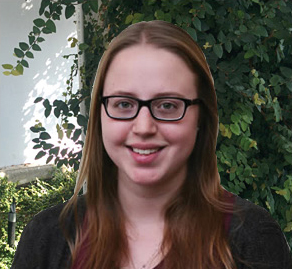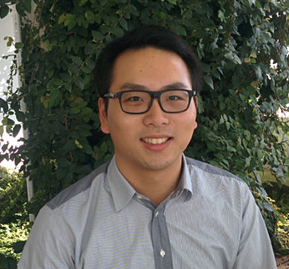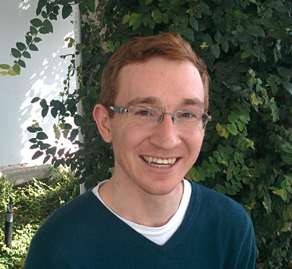Breadcrumbs
Meet the Recipients of the Inaugural Cecil Yip Doctoral Research Award

From targeting glioblastoma to improving nanoparticle traffic in the body to charting protein diversity in the brain, the recipients of the inaugural Cecil Yip Doctoral Research Award — Amy Arnold, Amy Hu, Wilson Poon and Jonathan Roth — are diving into their PhDs by tackling some of the biggest questions in biomedicine.
The award was established as a tribute to Professor Cecil Yip, who co-founded the Donnelly Centre. It recognizes outstanding candidates, in their first year of graduate studies, whose proposed research crosses disciplinary boundaries. The Award Committee is chaired by Professor Chris Yip and its members are: Professors Charlie Boone, Warren Chan, Andy Fraser, Quaid Morris and Will Ryu.
Meet the 2015's award recipients:
 Amy Arnold became fascinated with the idea of using polymers as drug vehicles when she was a summer research student, half way through her undergraduate degree in chemistry at University of Prince Edward Island. Having decided to pursue her PhD in polymer design and drug delivery in the Department of Chemistry, Arnold joined the Shoichet lab.
Amy Arnold became fascinated with the idea of using polymers as drug vehicles when she was a summer research student, half way through her undergraduate degree in chemistry at University of Prince Edward Island. Having decided to pursue her PhD in polymer design and drug delivery in the Department of Chemistry, Arnold joined the Shoichet lab.
“I chose the Shoichet lab for my PhD because I believe the lab is working at the frontier of both polymer chemistry and biomedical applications for innovative applications,” says Arnold.
During her PhD, Arnold will investigate if tiny polymer-based capsules, called nanomicelles, can be used to deliver drugs to glioblastoma – the deadliest form of brain cancer. “Even with aggressive surgery and chemotherapy, patients only survive for a few months,” says Arnold. Arnold will target the glioblastoma stem cells, from which the tumour spreads, with siRNAs that turn down the genes responsible for tumor invasion and drug resistance.
In the true spirit of the Donnelly Centre, Arnold is collaborating with other labs to achieve her goals. With the help of Sidhu and Moffat labs, Arnold has already coupled the nannomicelles to specific antibodies that will help deliver the siRNA to the brain tumor. Arnold’s collaborations extend beyond Toronto – Drs. Kevin Petrecca and Masad Damha from McGill University will provide siRNA and glioblastoma samples, respectively.
 Amy Hu’s project is also looking for ways to attack glioblastoma but her approach is different to Arnold’s. Co-supervised by Sidhu and Moffat in the Department of Molecular Genetics, Hu will carry out a comprehensive analysis of proteins known as the Ephrin receptors, which are hypothesized to play a role in glioblastoma stem cells and drive tumor growth and resistance.
Amy Hu’s project is also looking for ways to attack glioblastoma but her approach is different to Arnold’s. Co-supervised by Sidhu and Moffat in the Department of Molecular Genetics, Hu will carry out a comprehensive analysis of proteins known as the Ephrin receptors, which are hypothesized to play a role in glioblastoma stem cells and drive tumor growth and resistance.
“I feel that applying the Sidhu lab's technology of synthetic antibody development to the Moffat lab's study of cancer is extremely promising. The ultimate goal is to provide new hope for glioblastoma patients,” says Hu.
To better understand the causes behind tumour growth, Hu is using the synthetic antibody production platform to help develop and apply antibodies that specifically recognize different Ephrin receptors. This will allow Hu to analyze the dynamic changes in Ephrin receptors at the level of individual cancer stem cells in an effort to find potential drug targets.
Hu had previously worked as a researcher at the University of Ottawa’s Institute of Mental Health Research and then at Pfizer Canada. Once she earns her PhD, Hu wants to return to drug development in a senior role.
 A U of T engineering graduate, Wilson Poon first delved into an interdisciplinary biomedical research as a masters student at McGill in Montreal, where he investigated the use of nanoparticles in medicine. Poon will continue to pursue these interests as a PhD student in the Chan lab, jointly affiliated between the Donnelly Centre and the Institute of Biomaterials and Biomedical Engineering.
A U of T engineering graduate, Wilson Poon first delved into an interdisciplinary biomedical research as a masters student at McGill in Montreal, where he investigated the use of nanoparticles in medicine. Poon will continue to pursue these interests as a PhD student in the Chan lab, jointly affiliated between the Donnelly Centre and the Institute of Biomaterials and Biomedical Engineering.
The goal of Poon’s project is to find a way to make drug-delivering nanoparticles more effectively. Nanoparticles all too often accumulate in the liver, which causes chronic inflammation and limits their therapeutic potential. By removing the liver macrophages, the cells that engulf the tiny particles and accumulate them in the liver, Poon has been able to improve the nanoparticles’ ability to reach disease sites.
Straddling engineering and biology, Poon will likely collaborate both with Donnelly researchers, such as Andrew Emili to analyze the proteins involved in nanoparticle-blood interaction as these proteins may dictate their transport inside the body, and with external researchers such as Dr. Ian McGilvray at the UHN, who is a specialist in liver disease.
 Jonathan Roth graduated in Molecular Genetics at U of T before joining its graduate program, where he is pursuing a PhD under co-supervision of Drs. Ben Blencowe, at the Donnelly Centre and Anne-Claude Gingras, at Mount Sinai’s Lunenfeld Tanenbaum Research Institute (LTRI).
Jonathan Roth graduated in Molecular Genetics at U of T before joining its graduate program, where he is pursuing a PhD under co-supervision of Drs. Ben Blencowe, at the Donnelly Centre and Anne-Claude Gingras, at Mount Sinai’s Lunenfeld Tanenbaum Research Institute (LTRI).
Roth is investigating how alternative splicing – a process key to generating protein diversity in the cell — influences interactions between proteins that drive brain development and disease.
A project of this scope would be hard to carry out in a single research group. To analyze effects of alternative splicing on neural protein-protein interactions, Roth will use a robotic platform in collaboration with Drs. Mikko Taipale (Donnelly) and Jeff Wrana (LTRI) and also advanced mass spectrometry methods recently developed in Dr. Gingras’ lab. Roth will also employ the latest computational methods to analyze a vast amount of data that these experiments will produce.
“I think that the Donnelly Centre is a excellent place for my work, which involves the combination of different transcriptomic and proteomic approaches, the integration of which is only possible through the multidisciplinary and collaborative nature of the Donnelly Centre,” says Roth.
